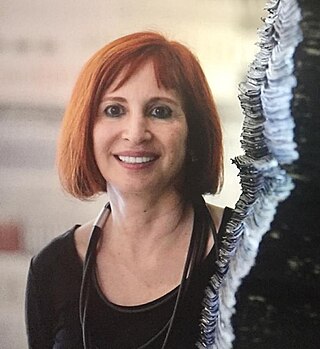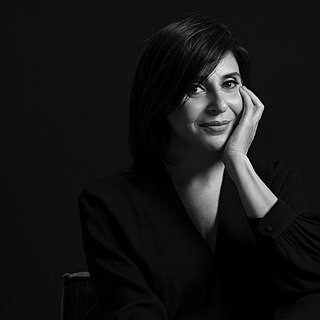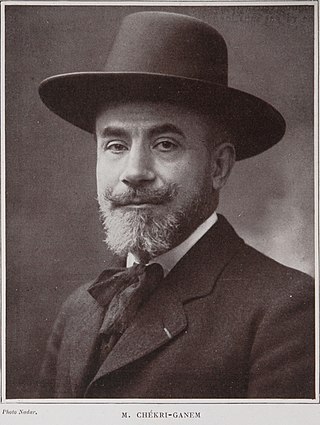Related Research Articles
Maison Bonfils was a French family-run company producing and selling photography and photographic products from Beirut from 1867 until 1918, from 1878 on renamed "F. Bonfils et Cie". The Bonfils ran the first and, in their time, most successful photographic studio in the city. Maison Bonfils produced studio portraits, staged biblical scenes, landscapes, and panoramic photographs.

Saint Joseph University of Beirut is a private Roman Catholic research university located in Beirut, Lebanon, which was founded in 1875 by French Jesuit missionaries and subsidized by the Government of France during the time when Lebanon was under Ottoman rule. It holds a reputation of being one of the leading academic institutions in Lebanon and Middle East. USJ's graduates includes seven Presidents, a Speaker of the Parliament of Lebanon, two Presidents of the Council of Ministers of Lebanon, Governors of the Banque du Liban, numerous legislators, ministers, judges, and high-ranking civil servants, including Commanders of the Lebanese Armed Forces and executives of the Internal Security Forces. As the oldest French university in Lebanon, it promotes Lebanese culture and upholds a policy of equal admission opportunity without consideration of ethno-religious affiliations. It advocates trilingual education, offering instruction in Arabic, French, and English. It is known in Lebanon and the Middle East for its university hospital, the Hôtel-Dieu de France, and for its Faculty of Law, modern Lebanon's oldest law school and the first law school in Lebanon since the ancient Roman law school of Berytus.

Vénus Khoury-Ghata is a French-Lebanese poet and writer.
May Murr, sometimes written as Mayy Murr was a Lebanese professor, historian, writer, poet, and political activist. Murr's poetry was influenced by her academic interests in geography and history, blending her literary and scholarly pursuits. Her works frequently emphasized Lebanon's role as a cradle of human civilization and religious significance, attributing the invention of the alphabet and several biblical events to Lebanese origins, and also touched on themes of spiritual love. She wrote in French, classical Arabic, and "Phoenician-Lebanese," maintaining consistent themes across languages while expressing her nationalistic sentiments.

Salah Stétié was a Lebanese writer and poet who wrote in the French language. He also served in various diplomatic positions for Lebanon in countries such as Morocco and France. Although his mother tongue was Arabic, Stetie chose to write in French.

Alexandre Najjar is a Lebanese and French writer, lawyer and literary critic. He was born in Beirut and studied at Panthéon-Assas University and University of Paris 1 Pantheon-Sorbonne. He holds a Doctorate in Business administration and is specialized in banking and finance law. He is the author of more than 30 books translated into more than 12 languages. In addition to poetry and novels, he has written non fiction works like the biography of Khalil Gibran, the author of The Prophet., a book about the 1936 Summer Olympic Games in Nazi Germany and a book about the Arab Spring.
Rasha al Ameer is a Lebanese novelist and publisher. She is best known for her novel in Arabic, The Last Day (2002), and as co-founder with her brother Lokman Slim of the publishing house Dar al-Jadeed.

Jalal Khoury was a playwright, theatre director, comedian and artistic editor.
Mouna Bassili Sehnaoui is a Lebanese painter, writer and artist.

Nabila Mounib is a Moroccan politician who currently serves as a member of parliament (MP) for the Casablanca-Settat constituency in the House of Representatives. She also served as General Secretary of the Unified Socialist Party from 2012 to 2023. She is the first woman to be elected head of a Moroccan party.
Amine Nakhle was a Lebanese lawyer, editor, poet and writer.

Nada Sehnaoui is a visual artist and political activist. Her artworks, spanning painting, mixed media works, sculpture and installations, have been widely exhibited internationally, and have been featured in the press and print publications worldwide.
Cécile Guilbert is a French writer and literary critic. She studied at Sciences-Po Paris. She has written a number of books on writers who are esprits libres or "free spirits": Saint Simon, Guy Debord, Laurence Sterne and Andy Warhol. She won the Prix Médicis de l'essai for Warhol spirit.She has also written novels such as Le Musée National (2000) and Réanimation (2012). She has written for France Culture, Canal Plus, Monde des Livres and Magazine Littéraire.
Fabrice Balanche is a geographer and specialist in the political geography and the geopolitics of Syria, Lebanon, Iraq and the Middle East in general.

Fadia Ahmad is a Spanish-Lebanese photographer, artist, and filmmaker.

Un été avec is a French radio programme and book series produced by France Inter since 2012. Broadcast in the summer, it consists of commentaries and reflections about a famous writer or literary work. The material is published as a book the year after the radio broadcast.

Delphine Gardey is a French historian and sociologist. She is a professor of contemporary history at the University of Geneva, Switzerland, and director of the Institute of Gender Studies at the Faculty of Social Sciences. She is currently a member of the editorial board of the journal Travail, Genre et Sociétés. She is also affiliated with "Groupement De Recherche Européen" (GDRE) and "Marché du travail et genre en Europe" (MAGE). She is a member of the "Genre, Travail, Mobilités" (GTM) Laboratory of "Centre de recherches sociologiques et politiques de Paris" (CRESPPA). Her work focuses mainly on the history of science and technology studies, feminist theories, as well as the place of women in history and society in general.

Chekri Ganem was a Lebanese intellectual, writer, playwright, poet, and journalist. He traveled extensively, and finally settled in France in 1895. In Paris, he became a dynamic political activist and leader in the Syro-Lebanese diaspora. He founded the Société des Amis de l'Orient in 1908 and the Lebanese Committee of Paris in 1912. He also played a significant role in the Arab Congress of 1913, where he was elected vice president. Ganem was a proponent of Lebanon's independence from the Ottoman Empire. He is considered the founding father of Francophone Lebanese literature, and his literary work was overtly political, becoming most manifest in his poetry collection Ronces et Fleurs. His masterpiece, Antar, was a widely-acclaimed theatrical fantasy, and an open manifesto of Arab nationalism. Ganem was named Commander of the Legion of Honor shortly before his death in 1929.

Diane Mazloum is a French-Lebanese writer. Her novels are set against the history or present in Lebanon.
References
- 1 2 "Hyam Yared" . Retrieved 2022-05-18.
- 1 2 "Biographie et actualités de Hyam Yared France Inter". www.franceinter.fr (in French). Retrieved 2022-05-18.
- 1 2 "Fondation Simone et Cino Del Duca". Institut de France (in French). Retrieved 2022-05-18.
- ↑ "Biographie et actualités de Hyam Yared France Inter". www.franceinter.fr (in French). Retrieved 2022-05-18.
- ↑ "قالب:استشهد بالويب/الفنلندية", ويكيبيديا (in Arabic), 2021-04-18, retrieved 2022-05-18
- 1 2 "Kateb Maktub". Google Docs. Retrieved 2022-05-18.
- ↑ "Deux nouveaux venus sur la scène culturelle libanaise". L'Orient Litteraire. Retrieved 2022-05-18.
- ↑ "Ombres et lumières". L'Orient Litteraire. Retrieved 2022-05-18.
- ↑ "Esthétique de la prédation" . Retrieved 2022-05-18.
- ↑ "Hyam Yared écrit pour trouer le silence". L'Orient Litteraire. Retrieved 2022-05-18.